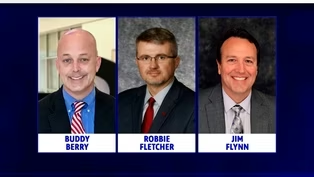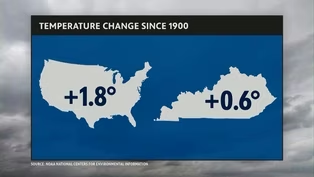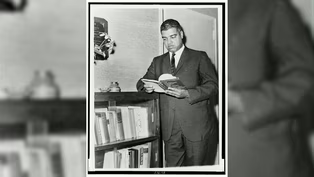
Investing in Disability Supports
Clip: Season 2 Episode 203 | 5m 26sVideo has Closed Captions
The state budget is still up for debate this legislative session.
The state budget is still up for debate this legislative session. Disability advocates say so far, they're winners.
Problems playing video? | Closed Captioning Feedback
Problems playing video? | Closed Captioning Feedback
Kentucky Edition is a local public television program presented by KET

Investing in Disability Supports
Clip: Season 2 Episode 203 | 5m 26sVideo has Closed Captions
The state budget is still up for debate this legislative session. Disability advocates say so far, they're winners.
Problems playing video? | Closed Captioning Feedback
How to Watch Kentucky Edition
Kentucky Edition is available to stream on pbs.org and the free PBS App, available on iPhone, Apple TV, Android TV, Android smartphones, Amazon Fire TV, Amazon Fire Tablet, Roku, Samsung Smart TV, and Vizio.
Providing Support for PBS.org
Learn Moreabout PBS online sponsorshipThe state budget is still up for debate and consideration this legislative session.
Disability advocates say so far they're winners.
As June Lefler reports, historic investments will go to services that support folks with intellectual and developmental disabilities and keep them in communities We all live in.
No one's too shy to dance at Down's syndrome of Louisville.
We just.
Keep their minds and bodies.
Moving.
Dozens of adults with Down syndrome come here during the week for the day program.
It's like school.
41 year old Chris Payne takes life skills classes at Dstl.
It's called Relationships.
We're learning about personal space and reflecting people's boundaries.
DSL supports people with Down's from birth to end of life.
It's the largest organization of its kind in the country.
I understand it that folks have moved here just for DSL.
Again.
As I understand it, folks have also moved to Indiana for Medicaid services from Louisville.
State Medicaid pays for most clients at DSL, but not Chris.
His dad pays out of pocket.
And that's one reason why Chris only attends once a week.
When he come more often with the waiver.
Absolutely.
Medicaid waivers offer a lot, but they're not guaranteed to everyone, and folks end up on wait lists that are notoriously long.
But what's frustrating for so many is that we are attracting people to our state.
We're attracting them to come and experience our services, and then the waivers are not available to them.
For 7 to 10 years.
There are about 15,000 waivers available at any given time for those with intellectual and developmental disabilities.
But there are 10,000 people on the waiting lists.
Kentucky's waivers offer amazing support, say advocates like Sheila SHUSTER.
That's why she wishes more people had access to them.
And their sole purpose is to try to keep people out of institutions, quite frankly.
Waivers typically pay for Therapies Day program, CMS, personal care, alterations to make someone's home more accessible and respite so family caregivers can have a break.
The supports for community living waiver notably offers housing, though not everyone wants or needs that.
A lot of the disability movement is around what we call nothing about us without us.
So you want people to be able to decide where they want to live and if they have a support network that wants to keep them at home, then you need to look and see what what needs to happen for this person to be able to be at home.
And today, disability advocates push state lawmakers to tackle the waiver waiting list.
Turns out this year, lawmakers did hear those demands.
And the House budget is like phenomenal.
We have never seen so many slots allocated.
State House lawmakers earmarked tens of millions of dollars to add 2500 more waivers.
Slots.
It's mind blowing.
It's so exciting.
That's more slots for people like Emily Gape, who has cerebral palsy.
This is our.
House.
We sit in the living room together.
What?
Caregivers sit with us?
It's like a family.
She's lucky enough to have a supports for community living waiver.
Emily lives in the suburbs of Louisville, and her house looks like any other in the cul de sac.
It's just owned and operated by pillar support.
This neighborhood is the only one like this in the United States that's fully integrated.
So we built 17 homes and then all the other homes that you know, and within that 99 are owned by other people.
And we did that because historically, people with intellectual disabilities were sort of pushed off to the side and without a voice.
And we didn't want them just to live in a community of other people with intellectual disabilities.
We want you to be their neighbor.
This is possible with help from caregivers like Mia Rose.
She made a career change during the pandemic and hasn't looked back since.
And literally within the first week of training, I felt this passion like I've been missing my higher adult life, like I should have been working with this.
Community for years.
She's like my another mother to me.
I can tell.
Her anything Amy stayed represents these providers and caregivers.
They are 100% always people with massive hearts.
She tells lawmakers if they want to help people with disabilities, they have to help the provider workforce.
That's why the state House budget earmarked nearly $50 million to better reimburse providers that offered these Medicaid services.
So that when slots are released, providers have the ability to ramp up, you know, offer higher wages, hire more employees, and oftentimes purchase homes for individuals to live with things like that.
All of which requires capital, right.
These investments won't end the waiver waitlists in Kentucky, but it will help thousands more people and their providers live a little easier for Kentucky.
Addition Ibeju-lekki.
Thank you, June.
Kentucky's House of Representatives passed its version of the state's two year spending plan several weeks ago.
Now, the budget and these additional waiver slots rests with the state's Senate.
Video has Closed Captions
Clip: S2 Ep203 | 3m 20s | Study shows 42% of people know someone who died by overdose. (3m 20s)
Justice for Breonna Taylor Act Reintroduced
Video has Closed Captions
Clip: S2 Ep203 | 3m 46s | McGarvey joined Paul in Louisville to re-introduce the Justice For Breonna Taylor Act. (3m 46s)
Video has Closed Captions
Clip: S2 Ep203 | 2m 8s | Potential policies to change Daylight Saving Time. (2m 8s)
Search for New Education Commissioner
Video has Closed Captions
Clip: S2 Ep203 | 52s | Finalists have been selected to potentially replace the former commissioner of education. (52s)
Video has Closed Captions
Clip: S2 Ep203 | 4m 53s | Weather and climate experts discuss the impact of Kentucky's changing climate. (4m 53s)
This Week in Kentucky History (03/11/2024)
Video has Closed Captions
Clip: S2 Ep203 | 2m 7s | A look back at this week in Kentucky's history. (2m 7s)
Providing Support for PBS.org
Learn Moreabout PBS online sponsorship
- News and Public Affairs

Top journalists deliver compelling original analysis of the hour's headlines.

- News and Public Affairs

FRONTLINE is investigative journalism that questions, explains and changes our world.












Support for PBS provided by:
Kentucky Edition is a local public television program presented by KET





